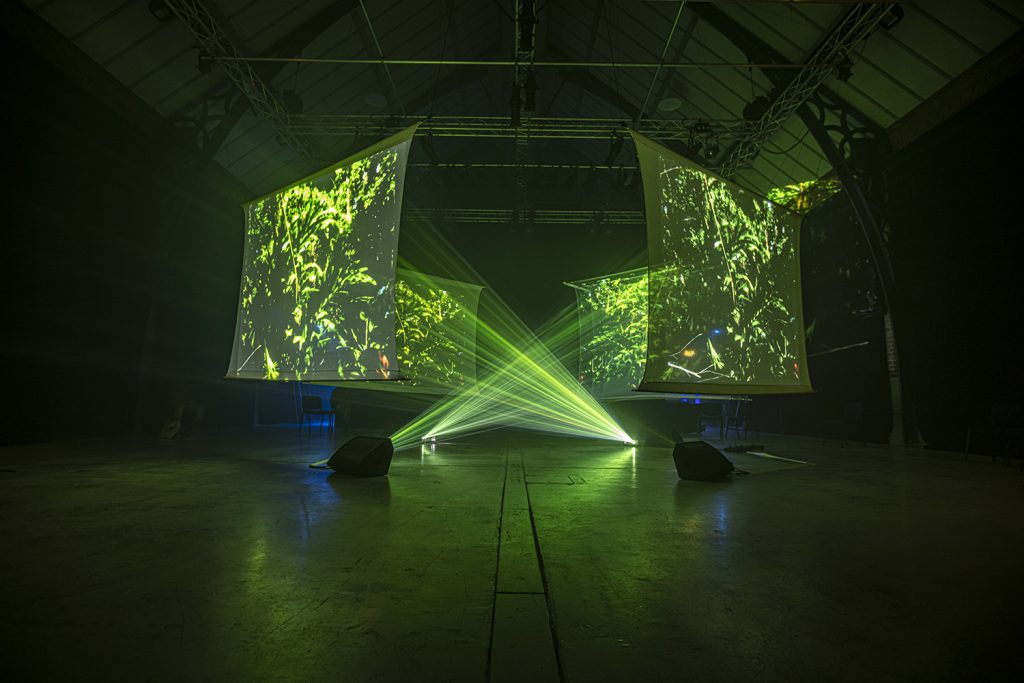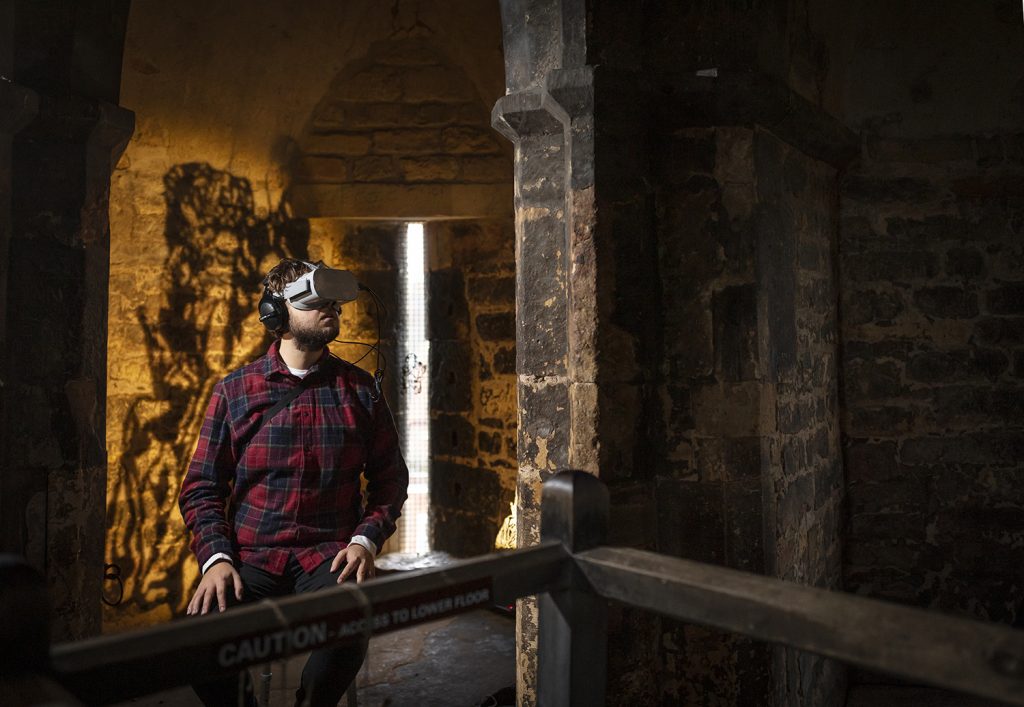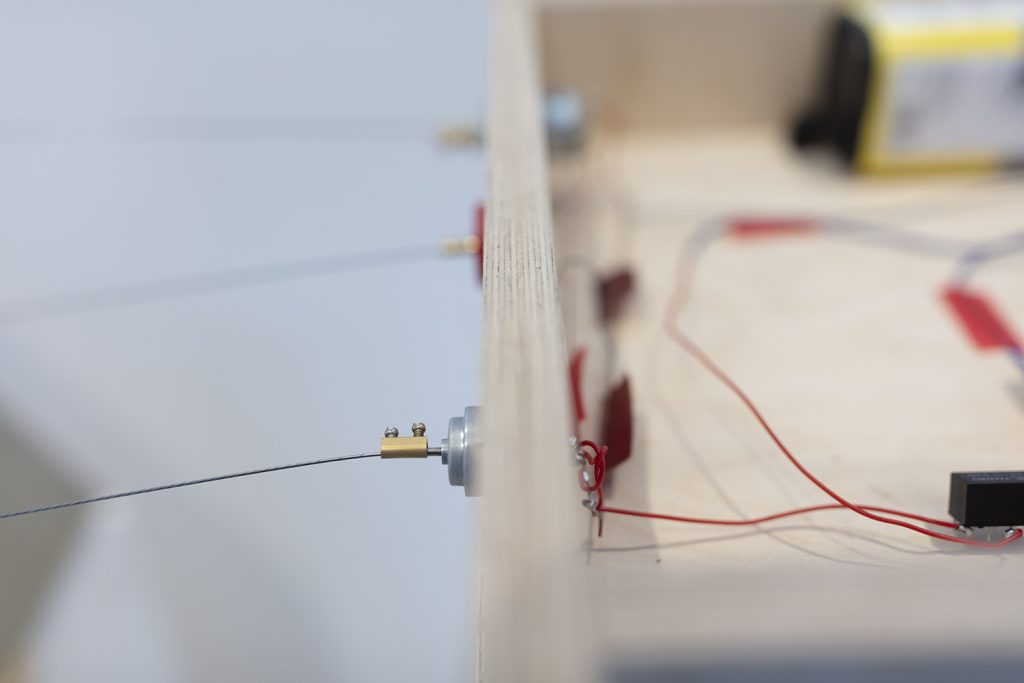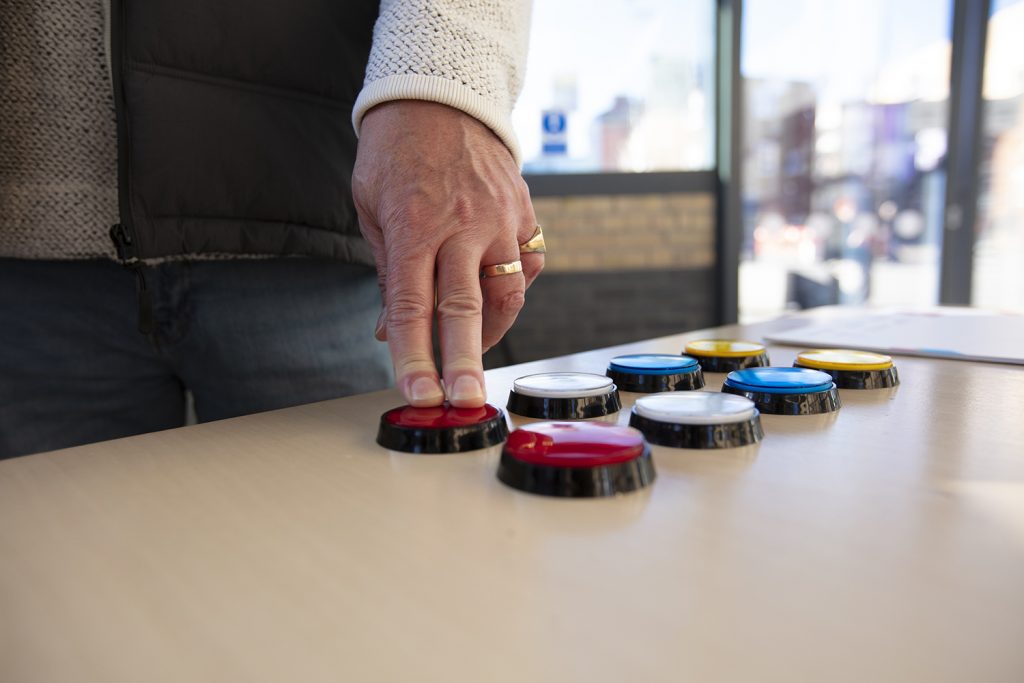For those who were unable to join us for this year’s Café Conversations at Frequency International Festival of Digital Culture 2019 in Lincoln, all four discussions are now available online.
Listen back to four conversations that engage artists and the general public in debates about key issues inspired by works within the festival programme. Themes for 2019 Café Conversations included: Digital Culture and the Anthropocene; The Activism of Caring; Humanising Data; Public Arts and Cultural Climates, Post Brexit.
Featuring Conversations Curator Bryn Williams, Frequency Co-Director Barry Hale, Mike Faulkner of artists collective ‘D-FUSE’, spoken word artist and sculptor Georgia Preece, kinetic mesmerist Thomas Grogan, kindness advocate and performance author Bernadette Russell, award-winning Social Artist Dan Thompson, visual memorialist Lindsay Seers, photo-documentarian Matt Snellin, Slow Gif artist Rhiannon Armstrong, sonic choreographer and print maker Robin Williamson, social artist Annabel McCourt, composer Simon Vincent, artist Will Hurt and members of the public.

1. Digital Culture and the Anthropocene
Digital Culture and the Anthropocene Part 1 (35:21)
Digital Culture and the Anthropocene Part 2 (30:40)
The global climate crisis can only be described as matter of planetary contamination, with us humans being held accountable beyond any judge or jury. The Anthropocene itself refers to a measurable global change catalysed by human activity, but what resonance does such a term hold with the British public. Is the Anthropocenic argument simply providing a dose of conspicuous jargon, rallying the climate activists, or is it the most overlooked and underestimated entity alive and at large today?
As advocates of the Arts and champions of all things digital, we at Frequency Festival invite you to join us in opening a new conversational debate. What relationships currently exist between the growing international smorgasbord of digital culture and the sometimes drastic methods of fighting climate change. How can a discussion of digital culture improve our comprehension of the Anthropocene and by extension the most pressing threats to our planet?
What is the Anthropocene and why should you care about it?
Bryn Williams and Frequency Co-Director Barry Hale are joined by Mike Faulkner of artists collective ‘D-FUSE’, spoken word artist and sculptor Georgia Preece, kinetic mesmerist Thomas Grogan and members of the general public.

2. The Activism of Caring
The Activism of Caring Part 1 (29:37)
The Activism of Caring Part 2 (30:50)
By definition, ‘Caring’ to the point of becoming ‘Activism’ should entail that the process of ‘concern’ has reached a point of desperation, allowing it to be expressed in such ways which were previously inaccessible.
However, can activism be generated within care, and which (if any) care sectors can accommodate an activist approach? What can we achieve through the simplicity of caring for another, and where does sympathy become empathy and empathy become anxiety, and anxiety become anguish? When can activism be found within the British social care system, and to what length do methods associated with social care relate/differ from those aligned to self-care and the rise in prominence it’s seen as digital culture grows in dominance.
Does the documentation of care through creative means warrant a reimagining of its role? How different might society be if ‘Caring’ was as much a choice as breathing? Where do we place convenience in this discussion?
What are the farthest extents of care… and should you care about caring to care about caring…?
Bryn Williams and Frequency Co-Director Barry Hale unpick the possibilities of ‘Activism’ within a spectrum of caring actions with kindness advocate and performance author Bernadette Russell, award-winning Social Artist Dan Thompson, internationally exhibited visual memorialist Lindsay Seers, photo-documentarian Matt Snellin, Care Researchers and members of the general public.

3. Humanising Data
Humanising Data Part 1 (30:39)
Humanising Data Part 2 (30:59)
How can we interpret ‘DATA’ in a way in which it might take on new forms and represent something other than statistics? The concept of ‘DATA’ as an art medium is one that grows in relevance each year, and as the popularity of digital art forms and techniques grow in tandem, it only makes sense to discuss the next steps.
With multiple artists involved in Frequency Festival incorporating digital engagement in their practice, it feels more appropriate than ever to unpick the potential of using human interaction to generate and maintain digital artworks and divulge the nature of ‘DATA’.
When we see an artwork, hear, smell, feel an artwork, our actions and generated reactions can be interpreted as creative ‘DATA’, meaning that developments in viewing and practicing art can be quantified, recorded and expanded upon. Ultimately making the public as equally responsible for the artwork as its original architect, humanising it, and adding a warm tactility to something known by most as a lifeless statistic.
Now in a truly digitised age, how can we re-interpret the virtual world in order to develop and enrich our understanding of the physical and the natural?
Bryn Williams and Frequency Co-Director Barry Hale explore the possible methodologies of public ‘DATA’ re-exposition with award-winning ‘Slow GIF ‘ artist Rhiannon Armstrong, sonic choreographer and printmaker Robin Williamson, Lincolnshire born interdisciplinary social artist Annabel McCourt and members of the general public.

4. Public Arts and Cultural Climates, Post Brexit
Public Arts and Cultural Climates, Post Brexit Part 1 (29:47)
Public Arts and Cultural Climates, Post Brexit Part 2 (29:57)
What if… the very idea of community driven arts groups and hubs was under threat?
As is the case for many other small organisations aiming to diversify and enrich British culture, the future of creative ventures such as Frequency and other outputs is shrouded in uncertainty because of Brexit. The current political climate has made it difficult to predict how creative social environments will continue to operate and flourish given the potential fluctuations in arts funding. Not to mention the questions Brexit might pose to the accessibility to the public arts for international communities.
So, what can be done?
Do we rely purely on our British stoicism to pull us through these periods of qualm, or do we embrace the concept of ‘not knowing’ and use the precariousness of the situation to push artistic and cultural reinvention? Nowadays, to talk and share ideas is everything, and the potency of the arts is often best measured in the depth of its communal outreach, not its government investments or the notoriety of the artists involved.
What if… You are the artist; your neighbourhood is the gallery and your communities are the curators. What does our departure from the EU ultimately mean for public Arts programmes and how might the UK’s cultural climate shift in the months and years to follow?
Bryn Williams and Frequency Co-Director Barry Hale assess and debate the future potential of British public Arts programmes and the cultural climates they might inhabit after Brexit with composer Simon Vincent, artist Will Hurt and members of the public.
